Isoko People of North America
The Isoko ethnic group of the Niger Delta of Nigeria is one of five ethnic groups of Delta State. The territory, the language and the people bear the same name.
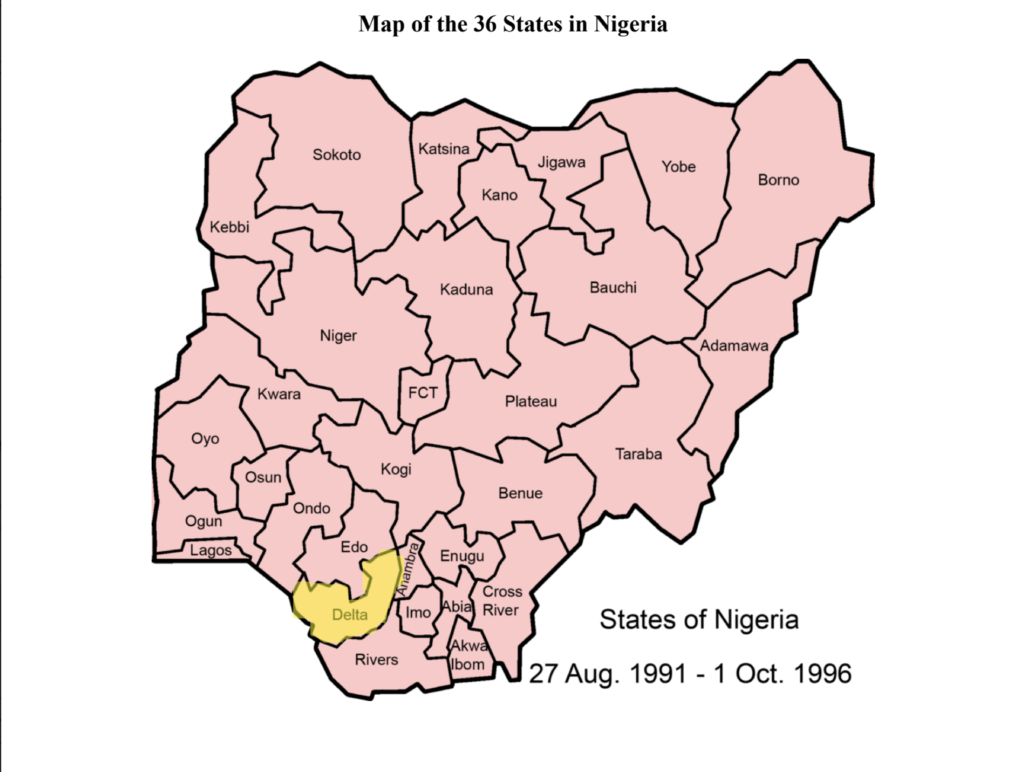
Geography and Location
The Isoko people are geographically located in the Southeastern part of Delta State, Nigeria occupying an estimated land mass of about 12,000 square kilometers and Delta State is in the South Western part of Nigeria (as in the Maps 1 above and 2 below).
Isokoland is made up of two local governments namely Isoko North with Ozoro as headquarters and Isoko South having Oleh as its headquarters. Isokoland is bounded to the north by Kwale, to the south by the Ijaws, and to the east by Ndokwa/Ndosimil; and to the west by the Urhobos.
There are a total of 17 clans in Isokoland namely:
1. Aviara; 2. Ellu; 3. Emede; 4. Emevor; 5. Enwhe/Okpolo; 6. Erowa/Umeh; 7. Igbide; 8. Irri; 9. Iyede; 10. Ofagbe; 11. Oleh; 12. Olomoro; 13. Okpe; 14. Owhe; 15. Oyede; 16. Ozoro, and 17. Uzere.
The total estimated population of Isoko people in Nigeria is put at about 2.1 million. Isokoland, like other inhabitants of the Niger Delta region experience the rainy and dry seasons of the tropical rain forest belt of Nigeria being just 5 degrees north of the equator.
The rainy season starts in May and ends in October while the dry season starts in mid- November and ends in April. A short dry spell occurs in August and is referred to as “August Break.” These seasons may now be affected by climate change as the rains often come late and fall harder than usual – possibly accounting for the 50-year flooding in 2012 along with recent spate of flooding in the area amongst other suspected human factors or causes in the Upper Niger and Benue Rivers of Nigeria.
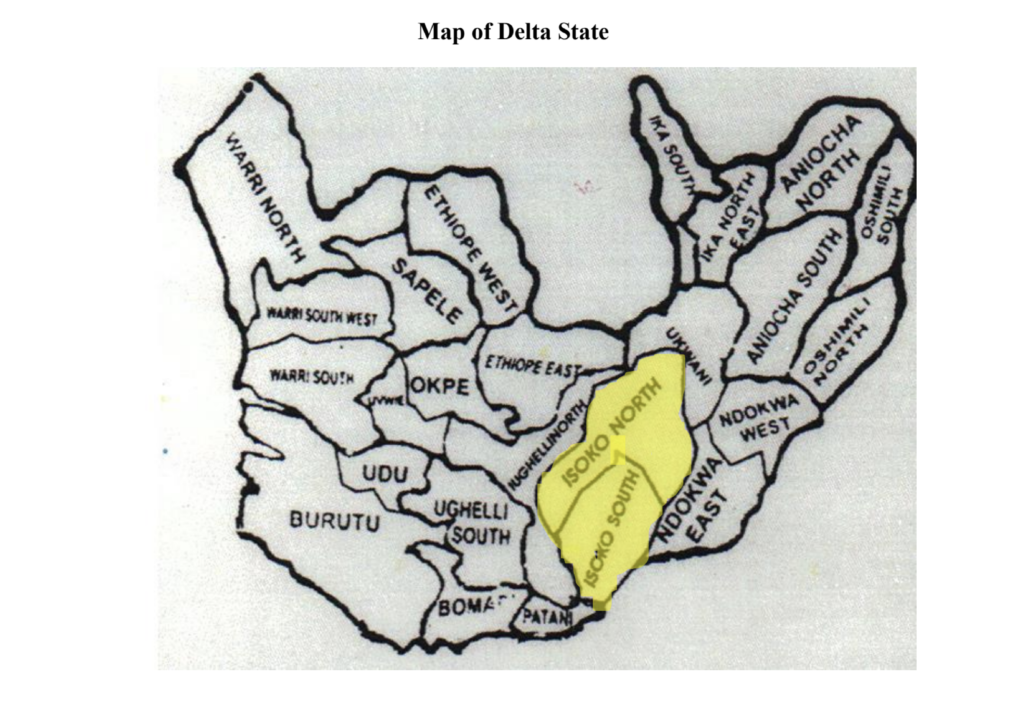
Historical Origins of Isoko People
Based on oral history and the history book of Professor Ikime, there were four major pathways of migration which resulted in today’s Isokoland. These pathways appear to have started around 1490 AD ending at about the late 1700 AD as the early colonialists invaded the Benin Empire and other smaller kingdoms coupled with maltreatments and internal wars. The four pathways include:
a) Eweri the founder of the Emedes migrating from Benin and arriving around 1490;
b) Erowa, Uzere and Okpe also migrating from Benin and arriving around the early to mid-1600s;
c) Ancestors of Iyede who left Benin and arrived between 1650 and 1700, while about the same time or shortly thereafter, Ozue is said to have led another group of migrants from Benin to present day Aviara; and
d) the last group in the early 1700s who migrated from what is today Eastern Nigeria across the River Niger to constitute Igbide, Enwhe-Okpolo and Umeh.
Additional migrations from other areas may have also occurred. For example, intra-migrations may have occurred in later years to form other communities such as:
• Irri coming from Uzere,
• Araya from Aviara, Ofagbe
• Ozoro from Okpe, Emevor and Owhe,
• Iyede-Ameh from Iyede and Owhelogbo
• Ellu from Owhe,
• Aradhe and Ovrode from Ellu even though Ovrodians dispute this migration route for the Ovrode people.
While the focus of this historical account is on the Isoko people, there has been inter-tribal relationships of our Isoko ancestors with other tribes in the Niger Delta region like the Urhobos, Ijaws, Itsekiris and Ndosimili/Abohs resulting up till today in inter-ethnic marriages. In conclusion, it can be said that most Isokos trace their origins back to the Benin Kingdom.
Social-Cultural activities of the Isoko People
The language spoken by the Isoko people is Isoko. Like many minority languages, Isoko faces a future of uncertainty and faces the threat of going into extinction if deliberate and conscious measures are not put in place by the leaders. The Isoko Development Union (IDU), a home-grown association has initiated efforts for the restoration and preservation of the language (see section on challenges and opportunities).
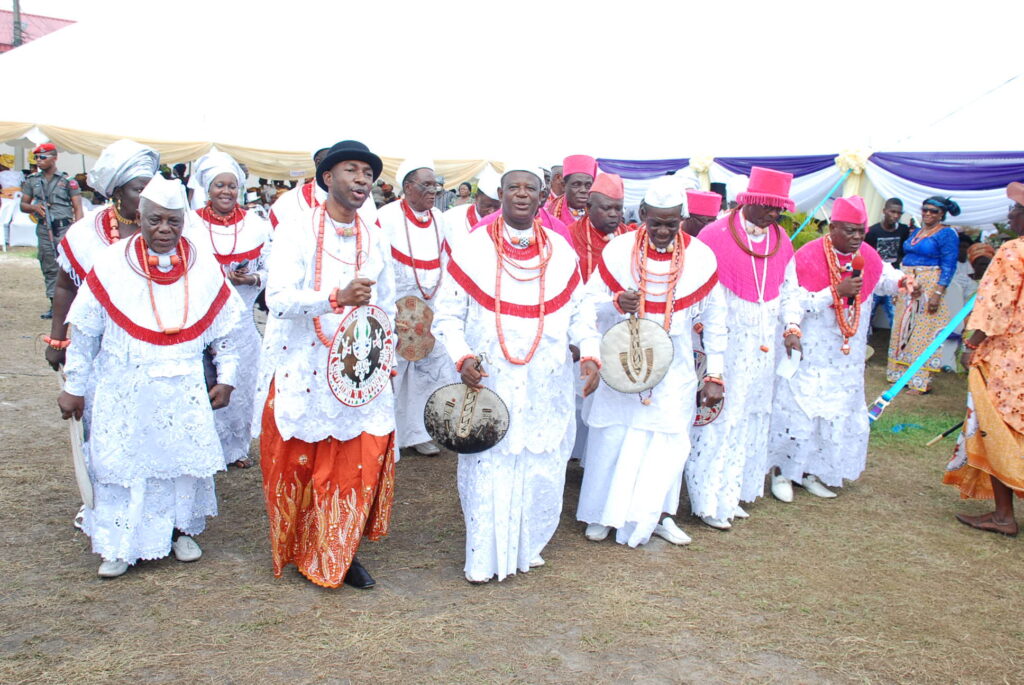
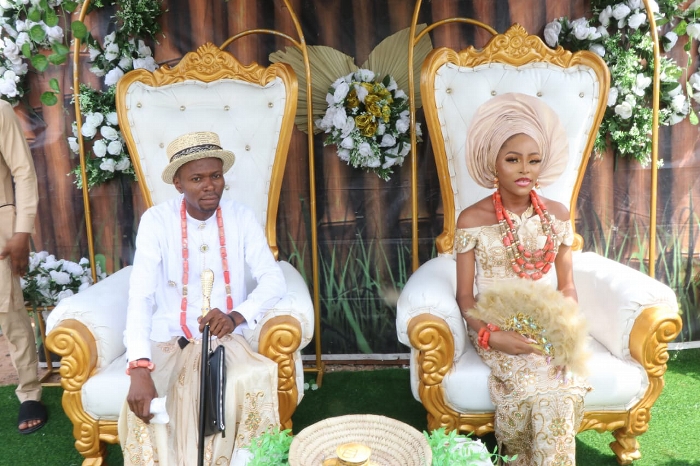
The Isokos observe several socio-cultural activities and norms. For example, the typical Isoko marriage is undertaken in three steps as follows:
Firstly, the groom along with his own family members (5-10) visits the family of the bride for introductions and declaration of his intentions. Drinks and kola nuts are exchanged with money to support these. During the second visit, the groom presents gifts to the girl’s father, who then summon his daughter to ask if she knows the man and would want to marry him. Upon her agreement to marry him, the gifts will then be accepted. Following this, a list of required items is given to the man for purchasing or paying the equivalent in cash. Customarily, the future father in-law introduces the man to about 5-10 members of his family and another 3-5 family members of the future mother in-law. It is required of the groom to visit these family members one after the other and fulfill every request demanded of him.
During the third visit, a date for the bride price is fixed. It is on this day that both the bride and groom’s families will together agree on the bride price after negotiation. A traditional wedding date is then fixed and is greeted with celebration leading up to when groom and bride become husband and wife.
On the religious front, most Isokos have become Christians even though traditional worship still thrives across the land. Oghene is the word for God in Isoko. Indeed in some Christian worship particularly in the Catholic denomination the influence of Isoko traditions can be visibly observed. The Isoko people believe that death is not the end of an individual and his relationship with family and loved ones. It is simply a transformation from a physical life form to a spiritual one. This is the basis of ancestral worship that the course of life is cyclical rather than linear.
As far as traditional festivals are concerned, the Isokos observe a number of festivals annually or biannually. They include:
• The Owise-Owhe festival in Owhe,
• The Eni festival in Uzere kingdom,
• The Abame festival in Igbide,
• The Ogri festival in Okpolo-Enwhe,
• The Urie Independence Fishing festival of Emevor,
• The Idje Fire festival of Ozoro, and Emevor respectively, and
• The Omode festival of Irri, to name a few.
Thus, each of the 17 clans celebrates one or two festivals annually. It is interesting to note that the Owise-Owhe festival has been researched and documented in a Ph.D. dissertation recently awarded by the Department of Art History, University of Wales, Aberystwyth, Wales; thus promoting the sociocultural activities of Isokoland towards gaining worldwide audience.
In the entertainment industry of Nigeria (movies and music), the Isoko people showcase a bevy of talents including the likes of Zeb Ejiro, Chico Ejiro, Peter Ejiro, Jetta Amata, Zack Amata, Ruke Amata, Kingsley Ogoro, Evi Edna Ogholi, Don Jazzy, Frank Vaughan, Okpa Williams and Evangelist Emmanuel Ofano to mention a few.
Education
The Isokos have always recognized the value of education as this was seen as a way to make progress. In the early years of the emerging kingdom, emphasis was placed on the training of teachers that eventually resulted in a glut of such teachers in Isoko communities. As opportunities and diasporan migration increased, educational diversity resulted and today, Isokos can be found in all professions from law to medicine, from engineering to accounting, from business to the academic arena as professors.
Secondary and post-secondary educational institutions can be found throughout Isokoland. These include:
• Notre Dame College, Ozoro,
• James Welch Grammar School, Emevor,
• Saint Joseph Teachers College, Ozoro,
• Saint Michael’s College, Oleh,
• Anglican Grammar School, Ozoro,
• Ofagbe Technical College, Ofagbe among others.
• The Delta State Polytechnic, Ozoro and the Delta State University Campus in Oleh, constitute the main post-secondary institutions in Isokoland…
Political Activities
For many years, the Urhobos and Isokos were considered as one people with similar dialect and hence in some history books they are called the Usobos of the Niger Delta. In other books they were referred to as Eastern Urhobos. Both the Urhobos and Isokos have strongly rejected these designations. From a recent publication of Otedo.com Otedo Web and Graphic Solution), I quote “In 1951, the Richards constitution came into operation in Nigeria. The Western Region Delimitation Commission created two Constituencies from Eastern Urhobo Native Authority (NA), and elections to the Western House of Assembly were conducted by electoral college system on individual and personal basis although political parties were behind the candidates. Late Chief James Otobo from Uzere Kingdom of Isoko and Chief Mowarin for the other side of Eastern Urhobo NA. Both contested and won their elections to the Western House of Assembly, Ibadan.”
In 1957, after winning the 1954 elections, Chief James Otobo influenced the creation of the Isoko District Council (IDC) from Eastern Urhobo. This marked the beginning of Isoko as a recognized distinct ethnolinguistic political group as opposed to its categorization as an Urhobo dialect. Upon the creation of the Midwest Region in 1963 coupled with the formation of local governments within the new region, the IDC became a full-fledged Isoko Local Government with its headquarters in Oleh after a choice between Ozoro and Oleh was resolved. By 1975, the local government was approved to award two separate license plates, Midwest Oleh (ML) and Midwest Ozoro (MLO).
Following the creation of Delta State in 1991 and the corresponding formation of new local governments within the new state, the existing Isoko Local Government became split in two: Isoko North and Isoko South with headquarters in Oleh and Ozoro respectively. Today, the political map of Delta State shows that Isoko North and South are bounded to the north by Ughelli North and Ethiope East local governments, to the south by Patani local government and the Atlantic Ocean (Bight of Benin), to the east by Ukwani and Ndokwa East local governments, and to the west by the southern part of Ughelli North local government.
Economic Activities
Traditionally, the economy of the Isokos has centered around: subsistence farming, fishing, teaching, and minor commercial trading. The commercial trading usually involves intra and inter village trade with historically designated town market days dominating these commercial activities.
The staple food crops of the Isokos are cassava and yams, with widespread production of palm oil and palm kernels. Women form a large proportion of the farming population. They also engage in the trade of food crops for cash to meet other basic household needs. On the said market days, it is common to see Isoko women peddling their assorted goods around neighboring villages.
The establishment of the Polytechnic at Ozoro and Delta State University campus in Oleh gave a modicum boost to increased economic activity. The newly built Ozoro sports stadium is considered one of the most modern as well as one of the largest in Nigeria, contributing its share towards enhancing economic activity in the area (especially during sporting events). Popular modes of transportation is the motorcycle and bicycle. Inter-city travel is by bus or car. Efforts are being made for the improvement of inter-city roads to facilitate economic activity.
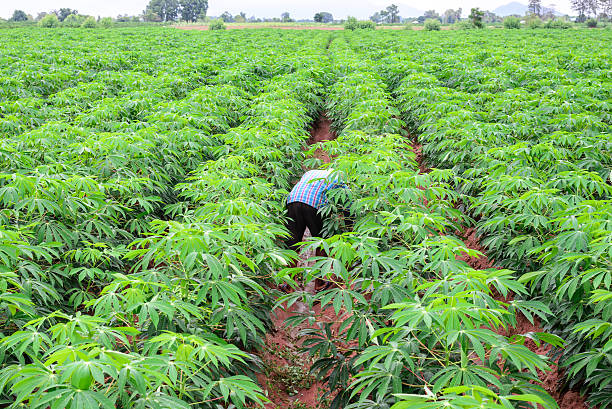
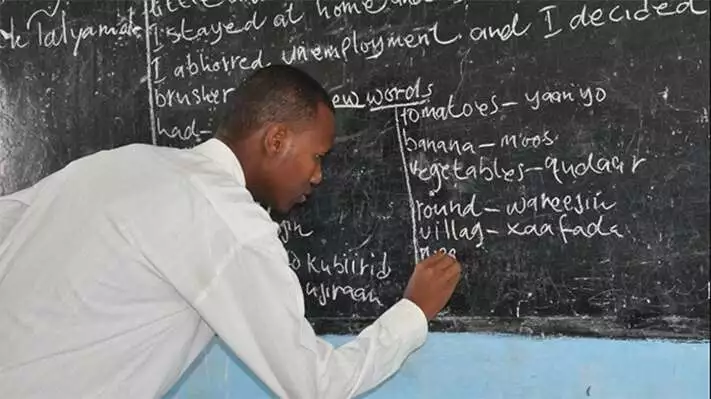
The Future of the Isoko people: Challenges and opportunities
The question to ask is what does the future hold for the Isoko people and Isokoland?
To answer this question, we must look at some of the challenges that have plagued and continue to dominate us as a people. The suggested challenges include: 1. Endangerment of the Isoko language from extinction, 2. Religious activities which threaten the Isoko culture, 3. Poor infrastructure, including environmental degradation, 4. Lack of industrial activities that make for the poor economy in Isoko local governments, 5. Functional Education, 6. Very poor health facilities in both local governments, and 7. Leadership and unity among Isoko people in Isokoland and in the Diaspora.
To address these challenges, IANA’s mission statement and objectives will strive to continually explore ways to: 1. Embark on projects that will contribute towards addressing these challenges; 2. Collaborate and cooperate with external organizations and association (especially the Isoko Develepment Union, IDU back home) to find solutions to some of these challenges; 3. Seek out pathways to involve the Kings and elected political leaders at local, state and federal levels to seriously participate in push-pull-politics to solutions to Isokoland that will address these challenges; 4. Reach out to Oil Companies whose operations in Isokoland degrade our land and destroy our cash crops, with a view to finding compensatory solutions that will help address some of these challenges.
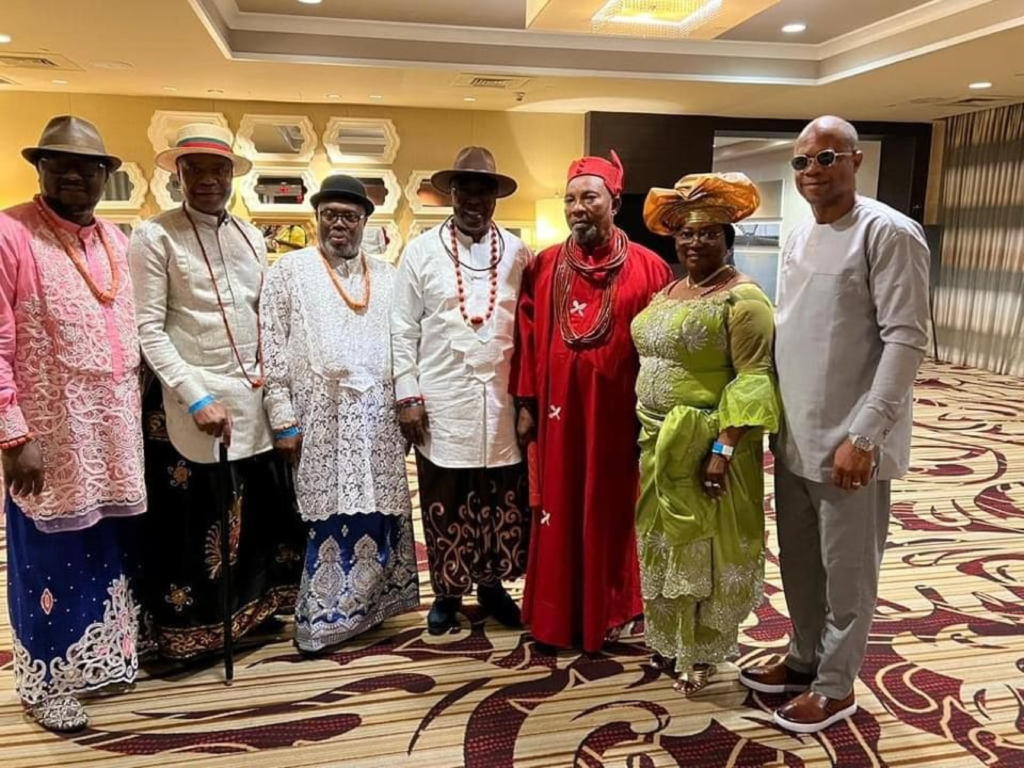
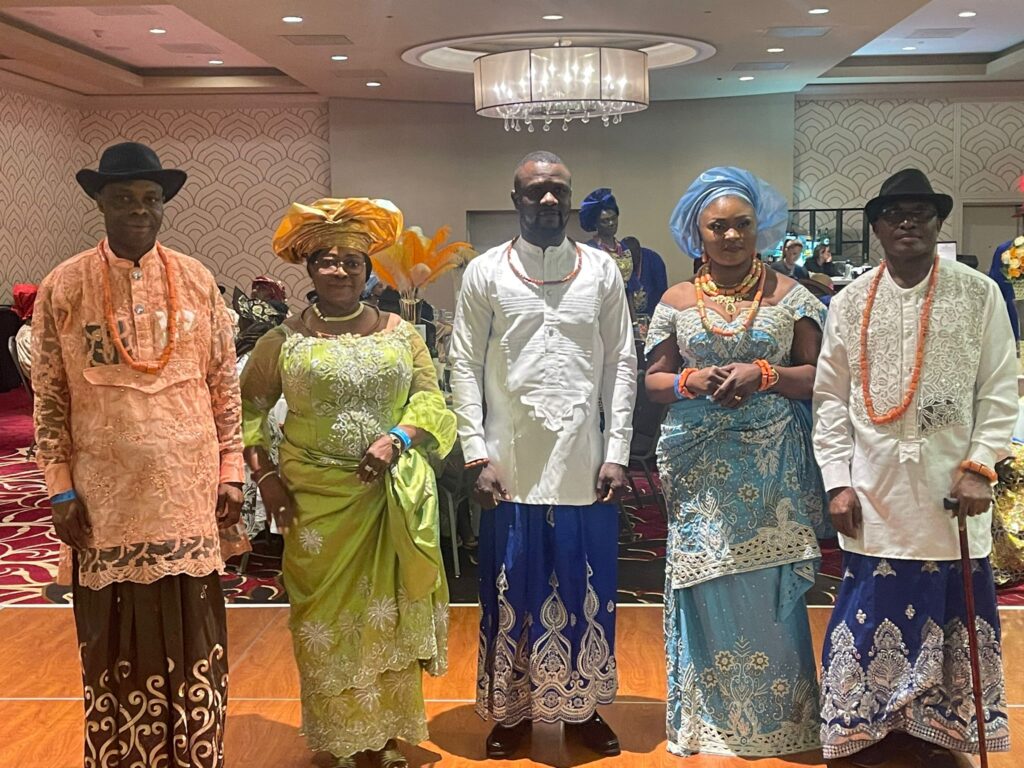
Brief historical account above culled from:
1. Paper prepared for the 2018 Convention of Isoko Association of North America (IANA), Los Angeles, California, USA; July 27 – 29, 2018 by Professor O. Onokpise
2. List of Isoko celebrities in the Nigerian Entertainment Industry – Courtesy internet search and youtube.
